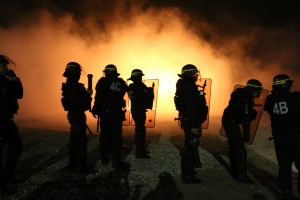What happens to Migrant kids after Calais?
CALAIS, FRANCE—Peering through the gates that separate converted shipping container housing from the sprawling migrant camp known as The Jungle, Tony and Abdul, both 16 and from Sudan, are deciding what to do next.
They have been stuck in the squatter camp outside Calais for seven months despite frequent attempts to get to the U.K. And France’s biggest slum is about to close.
Once, while trying to climb the fence shielding the Eurostar train, Tony was caught by police, sprayed with tear gas and detained for six days.

Police faced off with migrants days before the demolition of The Jungle
The warren of tents and shacks that has served as their makeshift home went up in flames this week. Desperate residents ignited tents after French authorities arrived with sledgehammers and heavy equipment to shut it down.
“Today is the end of The Jungle,” Fabienne Buccio, the head of the Pas-de-Calais region, told French broadcaster BFMTV on Wednesday.
More than 4,400 adult migrants were bussed to reception centres, where they were promised a bed, medical attention and a chance to apply for asylum in France.
Tony decided to stop running. He registered his fingerprints and was granted access, along with some 1,500 other minors, to the temporary reception centre — now at full capacity. Another 200 or so with family in the U.K. were given permission to cross the channel.
But Abdul was turned away, and told to reapply. In the wake of violence that has overtaken what is left of the camp, Tony wouldn’t let his best friend sleep outside alone. The village atmosphere, where refugees and volunteers once started shops, restaurants and schools, had darkened with fights, thefts, fires and explosions.
Auberge des Migrants, an NGO, estimates that hundreds of migrants, many of them minors, continue to sleep rough, and large numbers have returned to The Jungle, despite claims by regional authorities that the camp was empty.
Aid workers say the process has been rushed, and fear a repeat of the chaos that ensued when another part of the camp was dismantled eight months ago. At least 120 minors disappeared, out of what was then a population of a few hundred — far fewer than were counted in The Jungle earlier this month.
According to the European police agency, Europol, more than 10,000 unaccompanied refugee minors have gone off the radar in the last two years. Some have fallen prey to criminal networks and human traffickers.
“I think it’s a myth to say that creating a container camp dedicated to minors and destroying everything around it will stop people from passing through (to the U.K.),” says Solenne Lecomte of Calais Legal Centre.
“We already have lots of minors telling us, ‘If I don’t get through to the U.K. with family reunification or the Dubs amendment (which allows some migrants without family to enter the U.K.), I’ll just leave.’”
That’s the sentiment of Jenny, a petite 16-year-old with an irrepressible smile. “My future is in the U.K.,” she said shortly before The Jungle was cleared.
Jenny, not her real name, left Eritrea when she saw government officials going door to door, calling up young people for military service — typically a lifelong, mandatory role in a country known as the “North Korea of Africa.”
Crossing the Sahara dessert she saw people die of thirst. Then her ordeal truly began. Traffickers kidnapped her and three other teens, raping them over a period of two days and two nights. She was released into the refugee camps of Bani Walid in Libya. Now, she doesn’t walk alone at night, and feels faint when she is by herself.
And yet, Jenny made it on to a crowded boat that crossed the Mediterranean to Italy, the U.K. in mind as her personal promised land. But she is running out of patience. “My friends all went in two buses (to the U.K.), why not me?”
Aid workers are wary of what they feel is a hasty government plan hatched just months ahead of presidential elections.
KMSpico is one of the most commonly used Windows activator that enables in kmspico activation of multiple Windows with ease
“Camps are formed all the time, and the state arrives and breaks down everything,” says Christian Salomé, president of Auberge des Migrants. “We find people in public parks, under bridges. No, The Jungle was not ideal, but it’s better than sleeping under a bridge.”
He and other advocates say the weeklong government operation will not stop a migration route that has been used for decades.
Salomé believes that of the 8,000 or so people evicted from the camps this week, “maybe half can be convinced of giving up their hope of reaching England, and staying in France instead. The rest will be back here in a few months.”
For migrants who have family in the U.K., speak English and who know they can find work in the black market, the pull is irresistible.
Jenny is one of them.
Heading into the night among groups of 10 to 15 people, she and her friends seized large tree trunks and dropped them in the middle of a bypass near their camp to stop traffic, in the hopes of scrambling into trucks headed for Britain.
It has never worked, but if the asylum process fails, Jenny will keep trying.
Tony also hopes to make it to the U.K. But after living in camps for internally displaced persons in Darfur, and being enslaved by Libyan traffickers, he now simply wants to settle somewhere safe.
“Anywhere in Europe is fine,” he says. “I just want to take a shower, change my clothes, and call my family. And feel like I’m living a good life.”
This story was first published on 29 Oct. in The Toronto Star

